Zechariah (New Testament figure)
Zechariah (Hebrew: זְכַרְיָה Zəḵaryāh, "remember Yah"; Greek: Ζαχαρίας; Zacharias in KJV; Zachary in the Douay-Rheims Bible; Zakariyyāʾ (Arabic: زكـريـا) in Islamic tradition) is a figure in the New Testament part of the Christian Bible and the Quran,[2] hence venerated in Christianity and Islam.[3] In the Bible, he is the father of John the Baptist, a priest of the sons of Aaron in the Gospel of Luke (1:67-79), and the husband of Elizabeth who is a relative of the Virgin Mary (Luke, 1:36).[4]
Zechariah | |
|---|---|
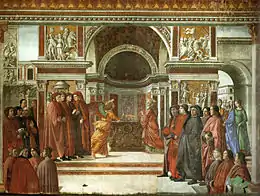 Annunciation of the Angel to Zechariah by Domenico Ghirlandaio (1490, fresco in the Tornabuoni Chapel, Florence) | |
| Priest, Prophet, Guardian of Mary, Devotee, Martyr[1] | |
| Born | 1st century BC Hebron (Joshua 21:11), the Levant |
| Died | 1st century BC (or early AD) Jerusalem (Matthew 23:35), the Levant |
| Venerated in | Catholic Church Orthodox Church Oriental Orthodox Church Anglicanism Lutheranism Islam |
| Canonized | Pre-Congregation |
| Feast | September 5 – Eastern Orthodox September 5 – Lutheran September 23 – Roman Catholic |
Biblical account
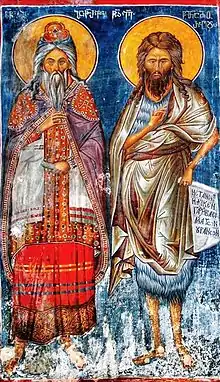
According to the Gospel of Luke, during the reign of king Herod, there was a priest named Zechariah, of the course of Abia, whose wife Elizabeth was also of the priestly family of Aaron. The evangelist states that both the parents were righteous before God, since they were "blameless" in observing the commandments and ordinances of the Lord. When the events related in Luke began, their marriage was still childless, because Elizabeth was "barren", and they were both "well advanced in years" (Luke 1:5–7).
The duties at the temple in Jerusalem alternated between each of the family lines that had descended from those appointed by king David (1 Chronicles 24:1–19).[5] Luke states that during the week when it was the duty of Zechariah's family line to serve at "the temple of the Lord", the lot for performing the incense offering had fallen to Zechariah (Luke 1:8–11).
The Gospel of Luke states that while Zechariah ministered at the altar of incense, an angel of the Lord appeared and announced to him that his wife would give birth to a son, whom he was to name John, and that this son would be the forerunner of the Lord (Luke 1:12–17). Citing their advanced age, Zechariah asked with disbelief for a sign whereby he would know the truth of this prophecy. In reply, the angel identified himself as Gabriel, sent especially by God to make this announcement, and added that because of Zechariah's doubt he would be struck dumb and "not able to speak, until the day that these things shall be performed". Consequently, when he went out to the waiting worshippers in the temple's outer courts, he was unable to speak the customary blessing (Luke 1:18–22).
After returning to his house in "Hebron, in the hill country of Judah",[6] his wife Elizabeth conceived. After Elizabeth completed her fifth month of pregnancy, her relative Mary was visited by the same angel, Gabriel. While still a virgin, Gabriel said to her, “Do not be afraid, Mary; you have found favor with God. You will conceive and give birth to a son, and you are to call him Jesus. 'How will this be,' Mary asked the angel, 'since I am a virgin?' The angel answered, 'The Holy Spirit will come on you, and the power of the Most High will overshadow you. So the holy one to be born will be called the Son of God.'" Joseph, whom Mary was betrothed to, found out that she was pregnant, obviously disturbing news. Because he "was faithful to the law, and yet did not want to expose her to public disgrace, he had in mind to divorce her quietly. But after he had considered this, an angel of the Lord appeared to him in a dream and said, 'Joseph son of David, do not be afraid to take Mary home as your wife, because what is conceived in her is from the Holy Spirit. She will give birth to a son, and you are to give him the name Jesus, because he will save his people from their sins.' 24 When Joseph woke up, he did what the angel of the Lord had commanded him and took Mary home as his wife."
Mary then travelled to visit her relative Elizabeth, having been told by the angel that Elizabeth was in her sixth month of pregnancy. Mary remained about three months before she returned to her own house (Luke 1:23–45;56).Elizabeth gave birth, and on the eighth day, when their son was to be circumcised according to the commandment, her neighbours and relatives assumed that he was to be named after his father. Elizabeth, however, insisted that his name was to be John; so the family then questioned her husband. As soon as Zechariah had written on a writing table: "His name is John", he regained the power of speech, and blessed "the Lord God of Israel" with a prophecy known as the Benedictus or "Song of Zechariah" (Luke 1:57–79). The child grew up and "waxed strong in spirit", but remained in the deserts of Judæa until he assumed the ministry that was to earn him the name "John the Baptist" (Luke 1:80; 3:2–3; Matthew 3:1).
Other Christian traditions
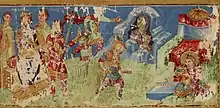
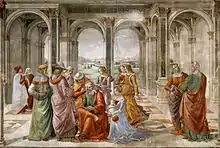
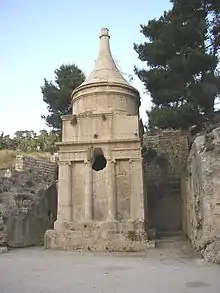
Origen suggested that the Zechariah mentioned in Matthew 23:35 as having been killed between the temple and the altar may be the father of John the Baptist.[7]
The Gospel of James, a 2nd-century apocryphal work, recounts that, at the time of the massacre of the Innocents, when King Herod ordered the slaughter of all males under the age of two in an attempt to prevent the prophesied Messiah from coming to Israel, Zechariah refused to divulge the whereabouts of his son (who was in hiding), and he was therefore murdered by Herod's soldiers. This account is also present in subsequent Eastern Orthodox tradition.
The Catholic Church commemorates him as a saint, along with Elizabeth, on September 23.[8] He is also venerated as a prophet in the Calendar of Saints of the Lutheran Church on September 5. The Eastern Orthodox Church also celebrates the feast day of Zechariah on September 5, together with Elizabeth, who is considered a matriarch. Zechariah and Elizabeth are invoked in several prayers during the Orthodox Mystery of Crowning (Sacrament of Marriage), as the priest blesses the newly married couple, saying "Thou who didst... accept Zechariah and Elizabeth, and didst make their offspring the Forerunner..." and "...bless them, O Lord our God, as Thou didst Zechariah and Elizabeth...". In the Greek Orthodox calendar, Zechariah and Elizabeth are also commemorated on June 24.
The Church of San Zaccaria in Venice, Italy claims to house the relics of Zechariah, entombed alongside those of Saint Athanasius of Alexandria. Armenians believe that the Gandzasar Monastery in Nagorno Karabakh, Azerbaijan contains his relics; however, his relics were also kept in the Great Church of Constantinople, where they were brought by the praefectus urbi Ursus on September 4, 415.[9]
In 2003, a 4th-century inscription on the Tomb of Absalom, a 1st-century monument in Jerusalem, was deciphered as, "This is the tomb of Zachariah, the martyr, the holy priest, the father of John." This suggests to some scholars that it is the burial place of Zechariah the father of John the Baptist. Professor Gideon Foerster at the Hebrew University states that the inscription tallies with a 6th-century Christian text stating that Zechariah was buried with Simon the Elder and James the brother of Jesus, and believes that both are authentic.[10] What makes the theory less plausible is the fact that the tomb is three centuries older than the Byzantine inscriptions, that a tomb with just two burial benches is unlikely to be used for three burials, as well as the fact that the identification of the tomb has repeatedly changed during its history.[11]
In Islam
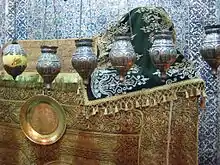
Part of a series on Islam Islamic prophets |
|---|
 |
|
|
Zechariah (Arabic: زكريا Zakariyyā) is also a prophet in Islam, and is mentioned in the Qur'an as the father of John the Baptist. Zechariah is also believed by some Muslims to have been a martyr. An old tradition narrates that Zakariyah was sawed in half,[12] in a death which resembles that attributed to Isaiah in Lives of the Prophets.
Zakariyah was a righteous priest[13] and prophet of God whose office was in the Second Temple in Jerusalem. He would frequently be in charge of managing the services of the temple[14] and he would always remain steadfast in prayer to God.
As he reached his old age, Zakariyah began to worry over who would continue the legacy of preaching the message of God after his death and who would carry on the daily services of the temple after him. Zakariyah started to pray to God for a son. The praying for the birth of an offspring was not merely out of the desire for a child.[13] He prayed both for himself and for the public – they needed a messenger, a man of God who would work in the service of the Lord after Zakariyah. Zakariyah had character and virtue and he wanted to transfer this to his spiritual heir as his most precious possession. His dream was to restore the household to the posterity of the Patriarch Jacob, and to make sure the message of God was renewed for Israel. As the Qur'an recounts:
A mention of the mercy of your Lord to His servant Zakariya. When he cried unto his Lord a cry in secret, saying: My Lord! Lo! the bones of me wax feeble and my head is shining with grey hair, and I have never been unblest in prayer to Thee, my Lord. Lo! I fear my kinsfolk after me, since my wife is barren. Oh, give me from Thy presence a successor who shall inherit of me and inherit (also) of the house of Jacob. And make him, my Lord, acceptable (unto Thee). [Quran 19:4–6 (Translated by Pickthall)]
As a gift from God, Zakariyah was given a son named Yaḥyá (Arabic: يحيى, identified with John the Baptist), a name specially chosen for this child alone. Muslim tradition narrates that Zakariyah was ninety-two years old[15] when he was told of John's birth.
In accordance with Zakariyah’s prayer, God made John (Yahya) renew the message of God, which had been corrupted and lost by the Israelites.[16] As the Qur'an says:
O Zachariah! Lo! We bring thee tidings of a son whose name is John; we have given the same name to none before (him). He said: My Lord! How can I have a son when my wife is barren and I have reached infirm old age? He said: So shall it be, your Lord says: It is easy to Me, and indeed I created you before, when you were nothing. He said: My Lord! give me a sign. He said: Your sign is that you will not be able to speak to the people three nights while in sound health.
According to the Qur'an, Zakariyah was the guardian of Maryam . The Qur'an states:
(Remember) when the wife of 'Imran said: My Lord! I have vowed unto Thee that which is in my belly as a consecrated (offering). Accept it from me. Lo! Thou, only Thou, art the Hearer, the Knower! And when she was delivered she said: My Lord! Lo! I am delivered of a female - Allah knew best of what she was delivered - the male is not as the female; and lo! I have named her Mary, and lo! I crave Thy protection for her and for her offspring from Satan the outcast. And her Lord accepted her with full acceptance and vouchsafed to her a goodly growth; and made Zachariah her guardian. Whenever Zachariah went into the sanctuary where she was, he found that she had food. He said: O Mary! Whence cometh unto thee this (food)? She answered: It is from Allah. Allah giveth without stint to whom He will.[Quran 3:35–37 (Translated by Pickthall)]
Muslim theology maintains that Zakariyah , along with John the Baptist and Jesus, ushered in a new era of prophets – all of whom came from the priestly descent of Amram(Imran), the father of the prophet Aaron. The fact that, of all the priests, it was Zakariyah who was given the duty of keeping care of Mary(Maryam) shows his status as a pious man. Zakariyah is frequently praised in the Qur'an as a prophet of God and righteous man. One such appraisal is in sura al-An'am: "And Zakariyah and Yahya and Isa and Eliyas. Each one was of the righteous."[Quran 6:85 (Translated by Pickthall)]
Qur'an translator Abdullah Yusuf Ali offers commentary on this one line[3] – suggesting that these particular prophets make a spiritual connection with one another. He points out that Yahya was a relative of Isa, while Eliyas was one who was present at the Transfiguration of Isa [17] on the Mount, as mentioned in the New Testament. Zakariyah meanwhile, through marriage, was the uncle of Isa and his son Yayha was referred to as Eliyas in the New Testament.[18]
Music
Marc-Antoine Charpentier, Canticum Zachariae, H.345, motet for soloists, chorus, 2 treble instruments, and continuo (1686 - 87)
See also
- Biblical narratives and the Qur'an
- Qiṣaṣ al-'Anbiyā’ (Arabic: قِـصَـص الْأَنـۢبِـيَـاء, Stories of the Prophets (in Islam))
References
- Did John the Baptist’s father die a martyr?
- Quran 19:2–15
- Abdullah Yusuf Ali, The Holy Qur'an: Text, Translation and Commentary, Note. 905: "The third group consists not of men of action, but Preachers of Truth, who led solitary lives. Their epithet is: "the Righteous". They form a connected group round Jesus. Zachariah was the father of John the Baptist, who is referenced as "Elias, which was for to come" (Matt 11:14); and John the Baptist is said to have been present and talked to Jesus at the Transfiguration on the Mount (Matt. 17:3)."
- Gospel of Luke, 1:5–79
- THE Dedication (Jesus' birth) "The priests serve 4 weeks per year: 1 week twice a year in courses, and the two week-long feasts, unleavened bread and tabernacles. Pentecost is a one-day observance, which would have come before Zacharias' (the 8th) course began, or at the latest, the 1st day of his course, which was from 12 thru 18 Sivan, or noon on the 19th, if Josephus is correct that courses changed at noon on the sabbaths." Josephus Antiquities b.7 ch.14 s.7 "eight days, from sabbath to sabbath." Josephus against Apion b.2 sect.8 "mid-day".
- compare Luke 1:39–40 with Joshua 21:11 The Treasury of Scripture Knowledge says, "This was most probably Hebron, a city of the priests, and situated in the hill country of Judea, (Joshua 11:21; 21:11, 13) about 25 miles south of Jerusalem, and nearly 100 from Nazareth."
- Reimund Bieringer, The Corinthian Correspondence (Peeters Publishers, 1996), page 497, footnote 20, ISBN 978-9068317749.
- Martyrologium Romanum (Libreria Editrice Vaticana 2001 ISBN 88-209-7210-7)
- Chronicon Paschale, sub anno 415.
- Jewish Yad Avshalom revealed as a Christian shrine from Byzantine era, Haaretz, July 22, 2003
- Joe Zias and Émile Puech (2004). "The Tomb of Absalom Reconsidered". The Foundation for Biblical Archaeology. Retrieved January 4, 2015.
- A-Z of Prophets in Islam and Judaism, B. M. Wheeler, Zechariah, Father of John
- Lives of the Prophets, Leila Azzam, Zacharias and John
- Abdullah Yusuf Ali, Qur'anic commentary to Chapter 19
- Historical Dictionary of Prophets In Islam and Judaism, B. M. Wheeler, Zechariah, father of John
- Luke 1:16: "And many of the children of Israel shall he turn to the Lord their God."
- Matthew 17:3: "And, behold, there appeared unto them Moses and Elias talking with him."
- Matthew 11:14–15: "And if ye will receive it, this is Elias, which was for to come. [15] He that hath ears to hear, let him hear."
![]() This article incorporates text from a publication now in the public domain: Easton, Matthew George (1897). Easton's Bible Dictionary (New and revised ed.). T. Nelson and Sons. Missing or empty
This article incorporates text from a publication now in the public domain: Easton, Matthew George (1897). Easton's Bible Dictionary (New and revised ed.). T. Nelson and Sons. Missing or empty |title= (help)
External links
| Wikimedia Commons has media related to Saint Zachary. |
Zechariah (New Testament figure) | ||
| Preceded by Renovating the Second Temple into Herod's Temple begins |
New Testament Events |
Succeeded by Gabriel announces to Mary that she will give birth to Jesus |